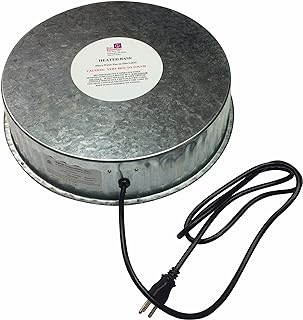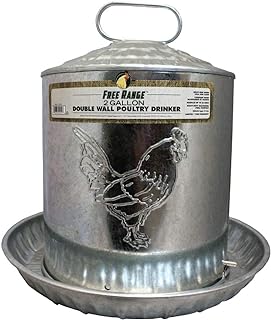Where I live in northern Minnesota, the main local seller at our Fleet store for keeping the water from freezing is this
Then you would need a metal poultry fount like the
Harris Farms Double Wall Poultry Drinker
At my local fleet store, they were both the same brand. I got the metal base heater and a 3 gallon metal fount for about $70 for both, but that was 3 years ago (Pre-pandemic) and I imagine the prices have gone up.
Anyway, my metal base heater kept my water from freezing down to -35F during the dead of winter. I have my waterer and feeder inside my chicken coop sheltered from the elements, but not from the cold. I think the metal base heater advertises to keep water unfrozen down to about +10F, but I have had clear water down to -35F in my coop.
I have a GFCI outlet on the backside of my house. I just run a 100' foot extension cord out to the chicken coop. You don't need a very expensive cord, either, because the metal base heater uses only about 125 watts, like a bright house lightbulb. I don't worry about getting a shock from the cord because I plug it into my GFCI outlet. If there is ever an issue with improper grounding, the GFCI switch would trip before anyone would get hurt. So, my extension cord sits under about 2-3 feet of snow in the winter time and I have never had any problems.
If you have concerns with running an extension cord outside on the ground, I suggest you get over it. It's not really a big deal. If you really have concerns, then buy some conduit and bury the cord under the ground. I leave my extension cord outside on the ground until spring when I start mowing the lawn, By then, of course, I don't need to heat my water anymore.
In general, I am a big fan of saving money anywhere and anyway I can in raising my chickens. However, keeping fresh water for the chickens in the winter time is one place where I knew not to go cheap. Small animals will die in the winter time if they don't get fresh water. Where I live, I had to invest in the best I could afford.
Some people talk about those heated dog dishes. It may work where you live if your climate is warmer than my winters. But I never liked the open aspect of the bowl where your chickens can get all wet, and the fact that a dog dish does not hold anywhere near the 3 gallons I get in my waterer.
For my 10 chickens, I would have to refill my 3 gallon waterer about every 10 days. Not a big deal for me, even in the dead of winter. I would not like to have to refill a heated dog dish everyday. Plus, the heated dog dishes I see in our local stores are not very good in comparison to the metal base and waterer I got for my chickens. My suggestion is to buy the best heated water system for your chickens that you can afford, based on where you live, and what your winter temps are mostly likely to get down to at night.




